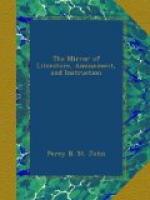* * * * *
The Maid of Elvar. By Allan Cunningham.
This is one of the most gratifying “appearances” in the literature of the day. It reminds us that however the poet’s harp may have remained unstrung, it has not lost its vigour or sweetness—its depth of feeling, or its melody of tone, and these too are ably sustained through nearly 600 stanzas in an exquisitely embellished narrative. The poem is “a song of other times;” the story is one of chivalrous love; the hero is a young warrior and poet; the Maid of Elvar offers a garland of gold for the best song in honour of one of his victories; “minstrels meet and sing, but the song of Eustace, though on another theme, is reckoned the best; the Maid hangs the gold chain round his neck, and retires, admiring the young stranger;” and thereby hangs the tale. As our limits will not allow us to detach a scene or incident, we must be content, for the present, with culling a few of the choicest flowers of the song.
CIVIL WAR.
Woe, woe was ours. Chief drew his
sword on chief:
Religion with her relique and her brand,
Made strife between our bosom-bones, and
grief
And lawless joy abounded in the land;
Our glass of glory sank nigh its last
sand;
Rank with its treason, priesthood with
its craft,
Turned Scotland’s war-lance to a
willow-wand.
But war arose in Scotland—civil
war;
Serf warred with chief, and father warred
with son,
The church too warred with all: her
evil star
That rules o’er sinking realms shone
like the sun—
Her lights waxed dim and died out one
by one—
Woe o’er the land hung like a funeral
pall:
The sword the bold could brave, the coward
shun,
But famine followed fast and fell on all—
Pale lips cried oft for food which came
not at their call.
RURAL PEACE.
Much mirth was theirs—war was
no wonder then;
Dread fled with danger, and the cottage
cocks,
The shepherd’s war-pipe, called
the sons of men
When morning’s wheel threw bright
dew from its spokes,
To pastures green to lead again their
flocks;
The horn of harvest followed with its
call;
Fast moved the sickle, and swift rose
the shocks,
Behind the reapers like a golden wall—
Gravely the farmer smiled, by turns approving
all.
The ripe corn waved in lone Dalgonar glen,
That, with its bosom basking in the sun,
Lies like a bird; the hum of working men
Joins with the sound of streams that southward
run,
With fragrant holms atween: then
mix in one
Beside a church, and round two ancient
towers
Form a deep fosse. Here sire is heired
by son,
And war comes never; ancle deep in flowers
In summer walk its dames among the sunny
bowers.




